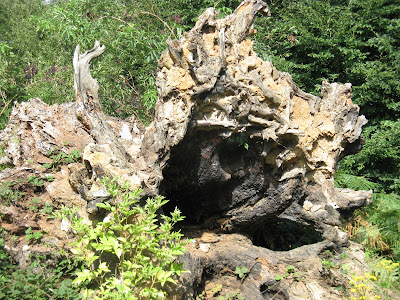This blog may help people explore some of the 'hidden' issues involved in certain media treatments of environmental and scientific issues. Using personal digital images, it's also intended to emphasise seasonal (and other) changes in natural history of the Swansea (South Wales) area. The material should help participants in field-based modules and people generally interested in the natural world. The views are wholly those of the author.
Wednesday, 16 February 2022
Can the UK Plant Trees More Quickly Than They Are Blown Down?
It's been repeatedly claimed that the UK needs to plant more trees to limit the effects of climate change. Mature trees store subtantial amounts of carbon, removed from the atmosphere by the process of photosynthesis. The UK's recent experiences, however, suggest that increasing mature tree numbers might be a quite difficult process. The so-called Great Storm of 1987, brought down about 15 million trees in Southern England. More recently, Storm Arwen (November 2021) brought down circa 8 and 4 million trees, respectively in Scotland and England (https://www.theguardian.com/environment/2021/dec/27/storm-arwen-trees-devastated-positives-aoe). Scotland and the North of England are currently threatened by back-to-back storms with gusts of up to 100mph (https://www.theguardian.com/uk-news/2022/feb/16/uk-weather-met-office-danger-life-warning-storms-dudley-eunice-scotland-northern-ireland-england). The scheduled storms Dudley and Eunice, are likely to flatten large numbers of trees and weaken others. Some people suggest that the wood from fallen trees, if uncleared, offers opportunities for certain organisms. That may be the case, but it appears, that the current rate of losses of mature trees, dwarfs the rate of planting. Tree planting programmes also generally involve putting in immature saplings. They have nothing like the carbon-caturing capacities of mature trees. It's certainly very remote from being a one for one replacement. The benefits from trees will not accrue if a) replacements are not like-for-like and b) populations actually decline.
Subscribe to:
Post Comments (Atom)
-
I n the UK and US, a pparently popular and successful vegan/vegetarian restaurants are reportedly closing or adding meat to their menus ( ...
-
Early ripening fruit may seem convenient but some folk think it confirms environmental stress. There's also a possibility th...


%20mating%20NWCW.jpg)


No comments:
Post a Comment